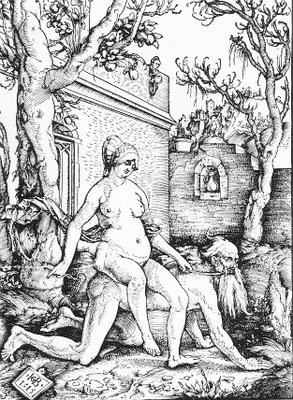Up your(s) Aristotle...

Basically, there are two kinds of people... those who know what the words praxis, diegesis, and mimesis mean, and those who do not. Fortunately, after this enlightening post all that will change and there will only be one type of person. Picture the unity! The liberation! But remember freedom is not a license for chaos. With knowledge comes responsibility. Adjustment. Discipline. Anyhow, soon the world will live as one and we'll be fine, I'm sure. Onward!
PRAXIS is a complex activity by which individuals create culture and society, and become critically conscious human beings. It is, according to Aristotle, one of the three basic activities of a free person (the other two are theoria and poiesis). It can roughly be considered the equivalent of "putting an idea into practice." More specifically, it is the process by which a theory or lesson becomes part of lived experience through a cycle of action-reflection-action. Rather than a theory being simply developed at the intellectual level, ideas are tested and experienced in the real world, followed by an opportunity for reflective contemplation and re-evaluation. In this way, abstract concepts are connected with lived reality.
DIEGESIS is the time/space continuum of a fictional world usually a narrative story, play or film. It is the world of the story. The diegesis includes events that are presumed to have occurred and actions and spaces not shown. A frequent distinction is made between diegetic sound and non or extra-diagetic sound in films. All the music in Antonioni's 'Blow Up,' for example, is diegetic, or takes place in the world of the movie through radios, record players, and live performance. Most soundtrack music is non-diegetic, i.e. not heard by the characters in the film, but employed for the benefit of the audience. Another important definition of diegesis has to do with the idea of telling rather than showing, as in the case of a narrator who explains what's going on rather than allowing the action to unfold without guidance (see mimesis). In diegesis, the narrator presents to the audience or the implied readers the actions (and perhaps) thoughts of the characters (including perhaps, but not necessarily, all that dwells within their imagination, their fantasies and dreams).
MIMESIS in its simplest context means "imitation" or "representation" in Greek. It is, in direct contrast to diegesis, the form itself which represents a fictitious reality, unassisted by the explanations of a narrator. It is showing, not telling. Mimesis is thus thought to be a means of perceiving the emotions of the characters on stage or in a book. It can also be the "truth" of the figures as they appear in sculpture or in painting; or the emotions as they are being configured in music, and of their being recognized by the onlooker as part of their human condition. Michael Davis, a translator and commentator of Aristotle writes: "At first glance, mimesis seems to be a stylizing of reality in which the ordinary features of our world are brought into focus by a certain exaggeration, the relationship of the imitation to the object it imitates being something like the relationship of dancing to walking. Imitation always involves selecting something from the continuum of experience, thus giving boundaries to what really has no beginning or end. Mimesis involves a framing of reality that announces that what is contained within the frame is not simply real. Thus the more 'real' the imitation the more fraudulent it becomes."
There you go. Practice using these words in a few sentences. Let their meaning sink in. Get praxismatic!
("Aristotle and Phyllis" 1513 woodcut by Hans Baldung Grien)

2 Comments:
Soooo, our praxis leads to creative expression through Mimesis, in which we employ or do not emply diegesis?
Speaking of diegetic sound, don't forget the scene in BLAZING SADDLES when Sheriff Bart encounters the Count Basie Orchestra in the prairie, when at first we just thought it was NON-diegetic soundtrack....
Mimesis is very cool... It so relates to a struggle on the continuum now underway in my own art...
Post a Comment
<< Home